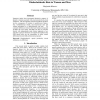Free Online Productivity Tools
i2Speak
i2Symbol
i2OCR
iTex2Img
iWeb2Print
iWeb2Shot
i2Type
iPdf2Split
iPdf2Merge
i2Bopomofo
i2Arabic
i2Style
i2Image
i2PDF
iLatex2Rtf
Sci2ools
INTERSPEECH
2010
2010
The influence of actual and perceived sexual orientation on diadochokinetic rate in women and men
Numerous studies have documented distinctive patterns of phonetic variation associated with actual and perceived sexual orientation. This investigation tested the hypothesis that these are the consequence of variation in speech-motor fluency. Gay, lesbian/bisexual (GLB), and heterosexual men and women participated in a diadochokinetic rate task. No consistent differences between GLB and heterosexual people in DDK rate were found, and DDK rate did not correlate directly with independently made listener judgments of sex typicality in speech. Results do not support the hypothesis that GLB speech styles are the consequence of motor control differences between GLB and heterosexual people.
| Added | 18 May 2011 |
| Updated | 18 May 2011 |
| Type | Journal |
| Year | 2010 |
| Where | INTERSPEECH |
| Authors | Benjamin Munson |
Comments (0)

